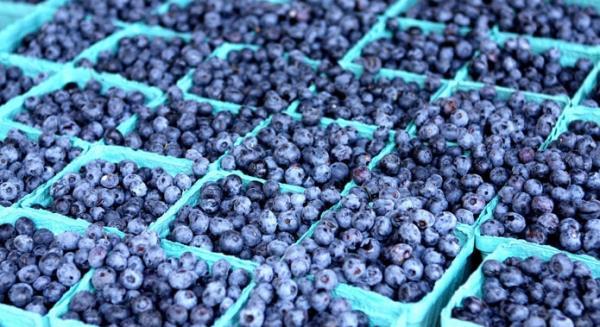Argentine Fresh Organic Blueberries Export Increased Significantly
Argentina is the second largest certified organic surface country in the world, only behind Australia. From 156 hectares in 2011, the growth of the harvested area of blueberries increased to 1001 hectares in 2019.
Organic blueberries production in Argentina occurs very naturally, thanks to its location in a latitude, where thermal amplitude and seasons well defined throughout the year, as well as the soils rich in organic matter and nutrients. At the same time, production is the result of a natural environment that does not favor the development of pests, which allows crops to be very healthy and minimally interfere with the environment.
Facundo Soria, Coordinator at the Organic Production Area in the Ministry of Agriculture, Livestock and Fisheries noted since 1990, Argentina has organic regulations, which are very similar in its requirements to those of the European Union, who immediately recognized Argentina as a third country. This allowed the country to quickly access and position itself as a reliable supplier in the main consumer organic market at the time. “Currently the Argentine organic certification has approval for the European Union, Japan and Switzerland, and is in negotiations to achieve equivalences with the United States and South Korea. These equivalences allow us to reach more and more consumers,” he added.
Argentina exported 47,922 tons of organic fruit in 2019. The total exported volume of blueberries in its various categories increased from 697,979 kg in 2015 to 2,206,935 kg in 2019. The export growth of fresh blueberries in 2019 was 70% compared to 2018, reaching 1,907 tons. According to SENASA (The National Food Safety and Quality Service of the Argentine government) official figures, the main destinations for Argentine organic blueberries were the European Union (56% of the total) and the United States (39%). In the case of the US market, the volume of exports is much higher as there is many producers who only certifies with the US certification and not Argentina's, so they are not accounted in the local statistics.
Francisco Estrada, representative of the Argentinean Blueberry Committee (ABC), commented: “Growth opportunities also important in those markets that are not yet developed like China, Southeast Asia and India, where the potential is huge.”
Concerning the domestic blueberry market in 2019, it represented 13,311 kg, accounting for 0.7% of the total production volume, ranking fourth after pears, apples and plums. “The consumer is becoming an increasingly conscious consumer, concerned about the food he eats. In 4-5 years the local market will be very important because we are educating our children with more and more concern for health and the environment, and these children are beginning to define the purchases at their homes,” concluded Estrada.
The Argentinean Blueberry Committee is a non-profit organization that was formally established in 2010 to promote a positive image for the Argentinean blueberry industry and to inform about the quality, reliability and availability of Argentinean blueberries in the U.S. and around the world. The Committee represents over 80% of Argentina's exports and is formed by the country's main blueberry exporters.
More information about ABC on its website.





